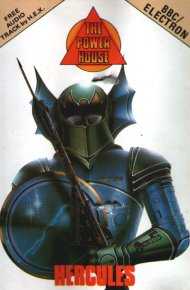Hercules (1984 video game)
| Hercules | |
|---|---|
 | |
| Developer(s) | Steve Bak |
| Publisher(s) | Interdisc, Alpha Omega, The Power House |
| Designer(s) | Steve Bak (C64) John White, Ayyaz Mahmood (Spectrum) Wayne Alan Maw (C16/Plus/4) Gary Tomlinson (BBC/Electron) |
| Platform(s) | Acorn Electron, BBC Micro, Commodore 16, Commodore 64, Commodore Plus/4, ZX Spectrum |
| Release date(s) | 1984 |
| Genre(s) | Platform game |
| Distribution | Tape |
Hercules is a platforming video game first published for the Commodore 64 by Interdisc in 1984. It was later reissued by Alpha Omega/The Power House (part of CRL Group) and ported to a number of other home computers.
Gameplay

The player takes the role of Hercules and must complete the Twelve Deathly Labours of Hercules. The game takes the form of many early platform games in that the player must jump from platform to platform and climb ropes in order to move across the screen from a fixed starting point to the goal while avoiding deadly enemies. The main twist in this game is that the platforms are not as they seem when the level begins. Some platforms will turn to fire when walked on (and so kill the player), others cannot be seen until walked on (so will appear out of thin air). There is no way of knowing which platforms will change when starting out so the player must use trial and error and memory to work out the correct path. This is made more difficult by the fact that the levels are not played in sequence. The game can begin with any one of eleven of the twelve labours (the twelfth is always kept until the end) and then every time the player dies or completes a labour, a different random labour begins. There are fifty screens in total.
Release
The original C64 version was first released in 1984 by the short-lived publisher Interdisc. This version was not reviewed in the gaming press and went largely ignored. It was later picked up by Alpha Omega (part of the CRL Group) and reissued in 1986 (at the £4.99 price point) when it was reviewed for the first time.[1] In late 1986, Alpha Omega became The Power House selling at the lower budget price point of £1.99. The game was then ported and released by The Power House for the ZX Spectrum in 1986 and the Acorn Electron, BBC Micro and Commodore 16/Plus/4 in 1987. The Power House release featured an audio track by H.E.X. on the cassette after the game data.
Critical reaction
Zzap!64 gave a very positive review of the C64 version in 1986. Despite criticising the graphics and sound, the game won high praise for being tricky, fast paced and addictive. The review concluded: "Don't judge a book by its cover - beneath the awful exterior lies a superb platform game" and awarded a score of 92%.[1]
The Spectrum port received a much less positive reception. Reviews were at best mixed. All reviews criticise the 'awful' graphics and sound. Your Sinclair awarded the game 3/10 with the author claiming he had given up on the game in frustration.[2] Sinclair User found the game similarly 'unfair' with 'unspeakably bad' graphics but said it had some 'neat twists' awarding an overall score of 2/5.[3] ZX Computing was more positive, giving a rating of 'good'. Although acknowledging the 'dreadful' presentation and 'unplayable' key sequence, the reviewer claimed the game "proves the point that you don't have to have great graphics for it to be addictive".[4]
References
- ↑ 1.0 1.1 "Hercules", Zzap!64, Issue 17, September 1986
- ↑ "Hercules", Your Sinclair, Issue 13, January 1987
- ↑ "Hercules", Sinclair User, Issue 58, January 1987
- ↑ "Hercules", ZX Computing, January 1987
External links
- Hercules at World of Spectrum
- Hercules at Lemon 64
- Hercules at Gamebase 64
- Hercules at Plus/4 World